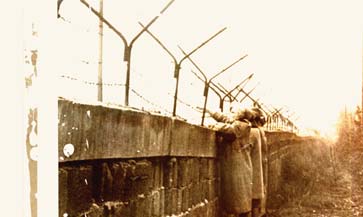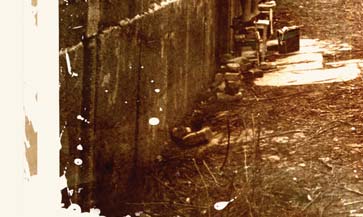the western half of the city could only be met by
of East Germany from simply walking away down
evacuation, by hunkering down for a siege, or by
the Friedrichstraße. The importance of this has
efforts to force troops through to the city from
often been underestimated in western scholarship,
West Germany. All of these actions carried with
which for years focused on Khrushchev and his
them the risk of war. There was a general fear that
policies. Thanks to the work of Hope Harrison we
a military confrontation over Berlin would quickly
now know that the Wall was almost wholly an East
escalate into general hostilities, in an era in which
German project, from beginning to end. Ulbricht
both sides were prepared to wage war with nuclear
was an unrepentant Stalinist and the East German
weapons. A crisis over Berlin, if it got out of
regime the most hard-line communist in Eastern
control, could lead to Armageddon.
Europe. Their persistent efforts to reconstruct the
East German economy along Stalinist lines caused
CIA analysts thus took very seriously any apparent
widespread hardship and directly fed the outflux
attempts to undermine western treaty rights in
of refugees.
Berlin. At the same time, it was believed that
Moscow would make strenuous efforts to negotiate
In the American intelligence community, the
before carrying out Khrushchev’s threats. Whatever
importance of what was termed the “refugee
the validity of this conclusion, it was, in a sense
problem” as a destabilizing factor in the Berlin
misleading. Since any negotiation along lines
situation was recognized early on. The greatest
acceptable to the Soviets inevitably would involve
concern was that East Berlin’s inability to resolve
compromising western treaty rights, no negotiated
the economic crisis they largely had created would
solution was really possible. The Berlin crisis thus
undermine Khrushchev’s political standing inside the
took the form of a series of threatened ultimata,
Kremlin and force him into some kind of precipitate
which never quite came off, with western observers
action. This concern grew as Khrushchev stepped
attempting to anticipate Soviet actions that were
up his pressure on the West: increased tensions
never taken.
worked directly to increase the flow of refugees,
which in turn, fed the growing economic crisis
But, although treaty issues often were at center
in East Germany, thereby increasing pressure
stage, the dynamic factor in the Berlin situation
on Khrushchev to force through some kind of
was the refugee problem. So long as the sector
solution—and so on, in an escalating spiral of
border between East and West Berlin was open,
tension with increasingly dire consequences.
West Berlin acted as an open conduit to the West.
Moreover, its growing prosperity stood in sharp
The possibility of some sort of Soviet action to
contrast to the drabness of life in the Soviet bloc.
restrict access to West Berlin—either as a repetition
The result was that through Berlin, East Germany
of the 1948 blockade, or as some other form of
was depopulating itself at the rate of 200-300,000
action—figured strongly in intelligence reporting
people per year, more than 1.1 million since the
throughout the last half of the 1950s. In November
founding of the communist state in 1949—and
1957, CIA’s Office of Current Intelligence (OCI)
this from what was, after all, a small country
warned that the Soviets might seal the sector
with a population of fewer than 16 million.1 In
borders between East and West Berlin as a means
the summer of 1961, Khrushchev joked with the
of applying pressure on the West.2 On 28 May
East German leader, Walter Ulbricht, that soon
1959, OCI warned that East Germany—not the
he would be the only person left in the country.
Soviet Union—might restrict traffic at the border
Ulbricht was not amused.
crossings, to reduce or eliminate uncontrolled access
to West Berlin, force the West Berlin government to
Small wonder that the East German’s relations
negotiate on issues of access, and reduce the labor
with Khrushchev seem to have been dominated by
shortage in East Germany.3
increasingly frantic attempts to reach agreement
1Current Weekly Intelligence Summary: “Flight of Refugees from East Germany,” 12 February 1959 (MORI: 45580) in Donald P. Steury (ed.), On the Front Lines of the Cold War: Documents on the Intelligence War in Berlin, 1946-1961 (Washington, D.C. CIA History Staff, Center for the Study of Intelligence, 1999) p. 455-58.
2Memorandum for the DDI; Subject: “The Berlin Situation,” 1 November 1957 (MORI: 44001 in Ibid., pp. 536-37.
3Current Weekly Intelligence Summary: “East Germany May Move against East German Sector Border Crossings,” 28 May 1959; Ibid., pp. 493-94.
2 1
A C I T Y T O R N A P A R T
Nonetheless, the Berlin crisis, when it came, was
D E C I P H E R I N G S O V I E T I N T E N T I O N S
something of surprise. The mid-1950s had been a
period of relative quiet in Berlin. Although it was
NIEs issued over the next two years amplified,
taken for granted that Soviet long-term goals were
but did not back away from these conclusions.9
to force the western allies out of the city, it was
Analysts nonetheless found Khrushchev’s intentions
assumed that they were not willing to risk war and
and actions difficult to predict. Tensions remained
accepted a western presence for the time being.4
high, but, given the uncompromising nature of his
It was known that the Soviets believed that long-
demands, Khrushchev was remarkably quiescent
term political and economic trends favored them.
during the Berlin crisis as a whole. The caution
Moreover, as their nuclear capabilities improved,
he demonstrated often contrasted puzzlingly
the Soviets would be more confident in their
with his habitual bombast. In January 1959,
dealings with the West—and would be more willing
Khrushchev sent clear signals that he would not
to force their demands.5
go to war over Berlin, but also that he would not
be part of an agreement that included the Bonn
Khrushchev’s November 1958 pronouncement thus
government—which then had as its Chancellor the
was seen as a sign that a period of Soviet resurgence
Christian Democrat Konrad Adenauer. When the
was beginning. The intervening two years had seen
foreign ministers of the Soviet Union and the three
considerable expansion of the Soviet long-range
Western Allies met in Geneva over May-June 1959,
bomber force, deployment of large numbers of
Khrushchev apparently sniffed the beginnings of
medium- and intermediate-range ballistic missiles
a crack in the Western alliance—perhaps from a
in Eastern Europe and significant progress in their
KGB report that Great Britain and France were
ICBM program. This did not mean that the Soviets
considering reducing their troop commitments to
would deliberately provoke a military confrontation,
West Berlin. Yet, when the United States vetoed
but that they were determined to force a discussion
the idea, Khrushchev responded only with an open
of the Berlin situation and that they would not
letter to Eisenhower. Apparently eager to push for a
back down. An NIE issued immediately after
solution at the beginning of the conference, he later
Khrushchev’s November pronouncement forecast
was disposed to wait for a more opportune moment.
that the Soviets would seek a summit at a time
“A year or a year and a half—this isn’t a key issue
and place of their own choosing, preferably under
for us,” he told the East German leader, Walter
circumstances in which they had some hopes of
Ulbricht.10 An SNIE issued during the conference
splitting the western alliance.6
concluded that Khrushchev probably did not seek
a real solution there, but saw it as the first stage
Another SNIE, issued two months later noted
in a process by which the Western Allies would
that the Soviets believed that their advances in
be eased gradually out of Berlin. “If the Soviets
nuclear weapons had considerably improved
allow the Geneva meeting to end in stalemate, they
their negotiating position.7 If the western powers
will presumably do so on the calculation that a
refused to recognize the de facto position in Central
period of additional pressure on the Berlin problem
Europe, another blockade of Berlin was possible.
will finally induce the Western Powers to make
Analysts believed that, in contrast to 1948, the
substantial concessions.” The Soviets still would
Soviets would not permit the resupply of the city,
shrink from a direct confrontation, but would be
but they would allow supplies to be carried to the
more likely, “to increase pressure on the Berlin
western garrisons. Western attempts to force open
issue gradually and only in such a degree as in their
access to the city would be opposed, but the Soviets
opinion would tend to induce the Western Powers
would otherwise avoid a military confrontation.8
to resume negotiations later . . .”11 In the meantime,
4NIE 11-3-56 Probable Short-Term Communist Capabilities and Intentions Regarding Berlin; 28 February 1956, pp. 1-3. (www.FOIA.
CIA.gov).
5NIE 11-4-56 Soviet Capabilities and Probable Course of Action Through 1961; 2 August 1956, p. 48. (www.FOIA.CIA.gov) 6SNIE 100-13-58 Soviet Objectives in the Berlin Crisis; 23 December 1958, Steury (ed.) op. cit. p. 431.
7SNIE 100-2-59 Probable Soviet Course of Action Regarding Berlin and Germany; 24 February 1959, p. 2 (www.FOIA.CIA.gov).
8Ibid. pp. 4-5.
9SNIE 100-2/1-59 The Berlin Crisis; 17 March 1959, passim (www.FOIA.CIA.gov).
10Aleksander Fursenko and Timothy Naftali, Khrushchev’s Cold War (New York and London: WW Norton, 2006), pp. 224-25.
2 2







B U I L D I N G O F T H E B E R L I N W A L L
Khrushchev went off to the United States, to visit
refused to negotiate, Khrushchev would probably
President Eisenhower.
feel compelled to conclude a separate treaty. His
long and continuing commitments to take this
The next opportune moment came a year later,
action probably act as a form of pressure either
at the Paris summit. Once again, Khrushchev
to demonstrate gains by negotiations or to carry
failed to make use of the opportunity to push the
out his repeated pledges to resolve the situation in
Berlin issue. Although he later claimed that he
Berlin by unilateral action. At any rate, Khrushchev
had decided there was little point in dealing with
has committed himself to a solution during 1961.14
the lame duck President Eisenhower,12 he may
also have decided after a preliminary meeting with
T O R E A D T H I S A R T I C L E I N I T S E N T I R E T Y , P L E A S E
De Gaulle that there was little hope of separating
R E F E R T O T H E D O C U M E N T S F O L D E R , O N T H E D V D .
Great Britain and France from the US on the Berlin
question.13 At any rate, he showed up in Paris
only to destroy the summit. Denouncing the U-2
flights over the Soviet Union (Francis Gary Powers
had been shot down just two weeks previously)
he demanded an apology and stormed out of the
summit. An apology was not forthcoming, and the
summit was at an end.
The winter of 1960-61 was one of anticipation,
as well as discontent. In a review of the Berlin
crisis prepared that Spring, CIA’s Office of
Current Intelligence observed that Khrushchev
had alternated between offers to negotiate over
B e r l i n , 3 0 N o v e m b e r, 1 9 6 1
Berlin and threats of unilateral action. Throughout,
B e f o r e t h e s t a r t o f t h e h o l i d a y s e a s o n ,
“Moscow” had, “aimed at liquidating Western rights
o n 3 0 N o v e m b e r, We s t B e r l i n e r s s t i l l
to remain in Berlin without restrictions pending
t r y t o s t a y i n c o n t a c t b y w a v i n g a t
German unification.” Since the West has no interest
f r i e n d s i n E a s t B e r l i n .
in negotiating away its rights, Moscow has used
deadlines, either explicit or implicit to guarantee
continuing Western interest in discussing the issue
in order to avoid a crisis.
There was a clear sense, however, that some
kind of decision was at hand: Moscow was still
willing to negotiate, even to settle for some kind
of interim agreement. However: If the West
11SNIE 100-7-59 Soviet Tactics on Berlin; 11 June 1959 (www.
FOIA.CIA.gov), pp. 1, 4.
12John Lewis Gaddis, The Cold War (London: Penguin, 2005),
p. 73.
13Sherman Kent, “The Summit Conference of 1960: An
Intelligence Officer’s View,” in Donald P. Steury (ed.),
Sherman Kent and the Board of National Estimates
(Washington, D.C.: Center for the Study of Intelligence,
1994), pp. 162-63.
14Current Intelligence Weekly Summary: “Soviet Policy on
Berlin and Germany,” 11 May 1961 Doc. Nr. 28202) in Steury
(ed.) On the Front Lines of the Cold War, pp. 545-46.
2 3
A C I T Y T O R N A P A R T
THE U.S. MILITARY RESPONSE
TO
THE 1960 - 1962 BERLIN CRISIS
D R . D O N A L D A . C A R T E R
THE U. S. ARMY CENTER OF MILITARY HISTORY
The election of a new U.S. president, John F.
the United States placed on its commitment to
Kennedy, in November 1960 renewed the East-
the people of West Berlin. Khrushchev replied
West tensions surrounding the city of Berlin
that he appreciated the frankness of Kennedy’s
that had simmered since the Allied occupation of
remarks, but if the U.S. insisted on maintaining its
Germany in 1945. Kennedy’s first meeting with
presence in Berlin after a treaty was signed, the
Soviet Premier Nikita S. Khrushchev in Vienna
Soviet Union would have no choice but to assist
in June 1961 did nothing to diffuse the sense of
the German Democratic Republic in defending its
confrontation. During their personal discussions,
borders. His decision to sign the treaty, he added,
Khrushchev handed an aide-memoire to Kennedy
was irrevocable. The Soviet Union would sign it in
that seemed to dare the president to oppose Soviet
December if the United States refused an interim
intentions. The missive accused the Federal
agreement. As he departed, Kennedy closed the
Republic of Germany of cultivating “saber-rattling
conversation saying it “would be a cold winter.”2
militarism” and of advocating revisions to the
borders that had been established after World War
Immediately after the conclusion of the Vienna
II. Only a permanent peace treaty that recognized
summit, in an unprecedented fireside chat on
the sovereignty of both East and West Germany,
Soviet television, Khrushchev repeated his
as they had evolved, would guarantee that they
demands, telling his people that the Soviets
would not again threaten the European peace.
would sign a peace treaty whether the West was
The conclusion of a German peace treaty, the
ready to do so or not. He added that the Soviet
document went on, would also solve the problem of
Union would oppose any and all violations of
normalizing the situation in West Berlin by making
East Germany’s sovereignty. The chairman of
the city a demilitarized free zone registered with
East Germany’s council of state, Walter Ulbricht,
the United Nations. Naturally, the memorandum
also publicly warned the West to negotiate its
concluded, any treaty, whether the United
use of access routes into Berlin with his country
States signed it or not, would terminate Western
or risk “interruptions.” He made it clear that the
occupation rights.1
Communists wanted the Western Allies out of
Berlin so that the city would no longer be a lure to
K H R U S H C H E V ’ S U L T I M A T U M
refugees from the East.3
On 4 June 1961, Kennedy met privately with Soviet
President Kennedy and his military advisers
Premier Nikita Khrushchev to make one last effort
weighed their options in light of Khrushchev’s
to impress upon the Soviet leader the importance
increasing belligerence. Understanding that the
1Aide-Memoire, Soviet Union to the United States, Handed by Premier Khrushchev to President Kennedy at Vienna, 4 Jun 1961, in Documents on Germany, 1944–1961, Senate Committee on Foreign Relations, Dec 1961, pp. 642–46.
2Memorandum of Conversation, 4 Jun 1961, in Foreign Relations of the United States, 1961–1963 (cited hereafter as FRUS) (Washington, D.C.: Government Printing Office, 1993), 14:96–98.
3“Khrushchev Demands 1961 Germany Pact,” and “Ulbricht Gives Warning on Berlin Access Route,” Stars and Stripes, European Edition, 16
Jun 1961.
2 4
B U I L D I N G O F T H E B E R L I N W A L L
Communists’ initial actions would include cutting
After several weeks of discussions with his cabinet,
off Western access to Berlin, the Joint Chiefs of
the National Security Council, the Joint Chiefs
Staff began refining contingency plans for various
of Staff, and a variety of other advisers, the
military probes of the main roadway into West
president made his decision. At 2200 on 25 July,
Berlin, an autobahn that ran 105 miles to the city
he addressed the nation on the situation in Berlin.
from the town of Helmstedt on the West German
After summarizing the course of events since his
border. Although they were prepared to mount an
meeting with Khrushchev, he stated that the United
airlift similar to the one that had broken a Soviet
States would never allow the Soviet Union to drive
blockade in 1949, they privately decried the lack
it out of Berlin, either gradually or by force. He
of options available to them for dealing with the
then announced a series of steps that he was taking
impending crisis. They informed the president and
to increase military readiness. First, he would ask
Secretary of Defense Robert S. McNamara that the
Congress for an immediate additional appropriation
Allies’ lack of military strength in Europe allowed
of $3.2 billion for the armed forces, about half of
only limited ground probes, which, if turned back
which would go to the procurement of conventional
by superior Communist forces, would result in a
ammunition, weapons, and equipment. A request
choice between accepting humiliation or initiating
would then follow, Kennedy said, to augment the
nuclear war. To keep that from happening, they
total authorized strength of the Army from 875,000
urged the president to build up U.S. military power
to 1 million men, and increase the Navy and Air
in Europe and to encourage the North Atlantic
Force active-duty strength by 29,000 and 63,000,
Treaty Organization (NATO) allies to do the same.4
respectively. He also called for a doubling and
tripling of draft calls in the coming months; the
From Europe, the Supreme Allied Commander
activation of some reservists and certain ready-
Europe [SACEUR], General Lauris Norstad, also
reserve units; and the extension of tours of duty
lobbied for increasing the U.S. military presence
for soldiers, sailors, and airmen scheduled to leave
in the theater. He praised the Seventh Army in
the service in the near future. Finally, the president
Europe as the best peacetime force the United
postponed programs to retire or mothball older
States had ever fielded and commended the
ships and aircraft and delayed the deactivation of a
dedication and commitment of NATO units, but he
number of B–47 bomber and aerial refueling wings.
stressed the overwhelming number of Soviet tanks,
Shortly thereafter, Secretary of Defense McNamara
aircraft, and men arrayed against those forces. He
announced that 50 percent of the Strategic Air
urged the president to call up additional reserve
Command’s bomber wings would be placed on
units and to deploy additional battle groups to
15-minute ground alert and that three of the Army’s
Europe under the guise of training exercises. He
divisions in the United States would be relieved
also wanted the president and the Joint Chiefs to
of training duties and prepared for emergency
position additional U.S. naval and air forces where
deployment to Europe.6
they could contribute to theater readiness, and he
suggested that the Seventh Army should conduct
T H E W A L L
more exercises that would require its divisions
to move into their alert positions. Those steps,
Meanwhile, the situation continued to deteriorate.
combined with an increase in U.S. military strength
Soviet and East German soldiers increased their
in Europe, would give the United States greater
harassment of U.S. vehicles and troop trains trying
freedom of action, the general said, and provide
to enter the city, and Soviet authorities periodically
alternatives short of nuclear war.5
renewed attempts to conduct unauthorized
4Memo, Joint Chiefs of Staff (JCS) for the President, 14 Jun 1961, sub: Supply Levels in Berlin, and Note by the Secretaries to the Joint Chiefs of Staff, Improved Position Anticipated from U.S. and Allied Build-up, 14 Jul 1961, both in Joint Chiefs of Staff, Central Decimal File, 1961, Record Group (RG) 218, National Archives, College Park, Md. (NACP).
5Telg, Supreme Allied Commander, Europe (Norstad), to JCS, 27 Jun 1961, in FRUS, 1961–1963, 14:136–38; Msg, U.S. Commander in Chief, Europe (USCINCEUR), to JCS, 2 Jun 1961, Msg no. ECJCO-9-88008, Joint Chiefs of Staff, Central Decimal File, 1961, RG 218, NACP;
“Norstad Urges Quiet Buildup,” Stars and Stripes, European Edition, 10 Jul 1961.
6Memo of Meeting on Berlin, 18 Jul 1961; Memo of Minutes of the National Security Council Meeting, 19 Jul 1961; and National Security Action Memorandum 62, 24 Jul 1961; all in FRUS, 1961–1963, 14:215–16, 219–22, and 225–26, respectively; Radio and Television Report to the American People on the Berlin Crisis, in Public Papers of the Presidents of the United States, John F. Kennedy, 1961 (Washington, D.C.: Government Printing Office, 1962), pp. 533–40; “Kennedy Asks Power to Exten










